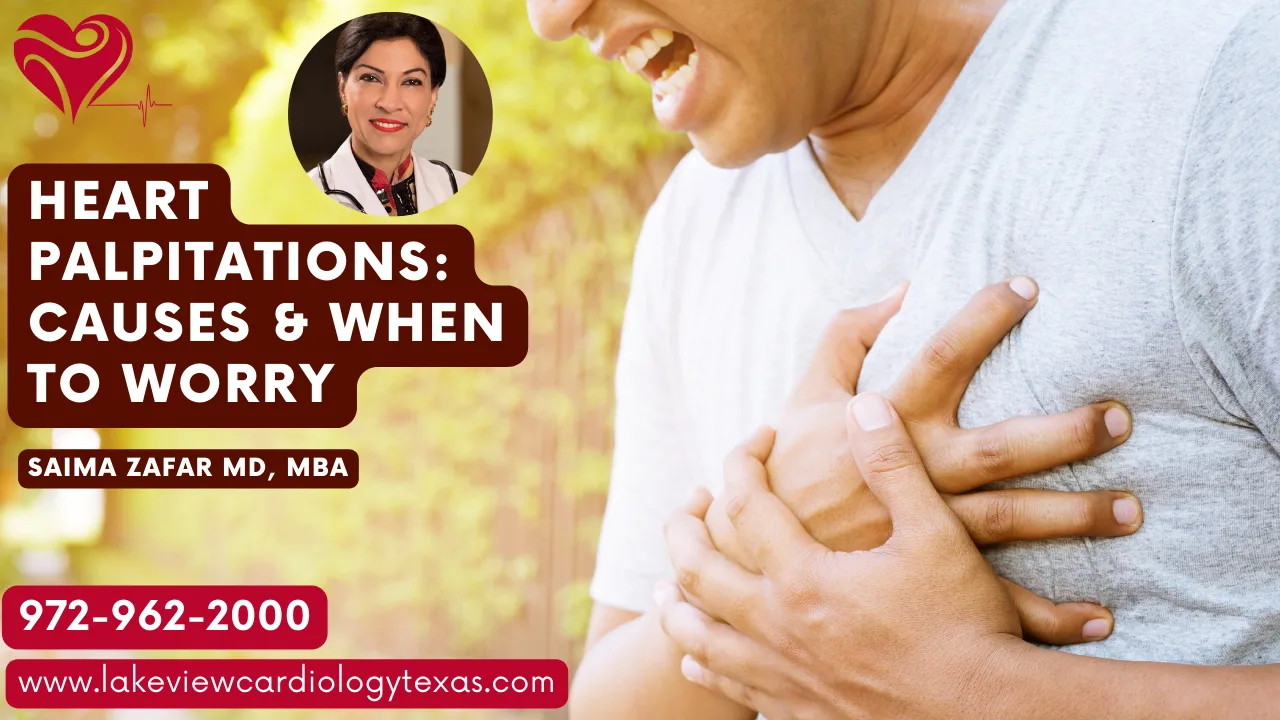Heart Palpitations: Causes & When to Worry
Introduction
Almost everyone experiences heart palpitations at some point in life. It may feel like your heart is racing, fluttering, pounding, or skipping a beat. For most people, palpitations are harmless and temporary, often caused by stress, caffeine, or dehydration. But sometimes, they can signal an underlying heart condition that requires medical attention.
In this detailed guide, we’ll explore what heart palpitations are, their common causes, risk factors, symptoms, when to worry, and how to manage them effectively.
What Are Heart Palpitations?
Heart palpitations are the sensation of feeling your heartbeat. You may notice your heart beating:
-
Too fast (tachycardia)
-
Too slow (bradycardia)
-
Irregularly (arrhythmia)
-
Stronger than usual
Most of the time, palpitations last only a few seconds or minutes and resolve on their own. They may happen while resting, after exercise, or even during sleep.
Common Causes of Heart Palpitations
1. Lifestyle Triggers
-
Stress & Anxiety – Emotional stress releases adrenaline, which speeds up the heart. Panic attacks can also trigger palpitations.
-
Caffeine & Energy Drinks – High doses of caffeine or stimulants can make your heart race.
-
Alcohol – Excessive drinking can disrupt your heart rhythm.
-
Smoking & Nicotine – Both speed up heart rate and may cause irregular beats.
-
Exercise – Intense physical activity temporarily increases heart rate.
2. Medical Conditions
-
Dehydration – Low fluid levels affect blood volume and heart rhythm.
-
Low Blood Sugar (Hypoglycemia) – Can cause dizziness, sweating, and palpitations.
-
Electrolyte Imbalances – Low potassium, magnesium, or sodium may trigger irregular beats.
-
Thyroid Disorders – Overactive thyroid (hyperthyroidism) often causes palpitations.
-
Fever or Infections – Increases heart rate as the body fights illness.
3. Heart-Related Conditions
While many palpitations are harmless, sometimes they are linked to heart problems, such as:
-
Atrial fibrillation (AFib)
-
Supraventricular tachycardia (SVT)
-
Ventricular tachycardia
-
Heart valve disease
-
Heart failure
-
Coronary artery disease
Symptoms That May Accompany Palpitations
Palpitations are not always a cause for alarm, but if you experience them along with other symptoms, it could indicate a serious condition. Look out for:
-
Chest pain or pressure
-
Shortness of breath
-
Dizziness or fainting
-
Fatigue or weakness
-
Sweating
-
Rapid or irregular pulse
If these symptoms appear, seek medical help immediately.
When Should You Worry About Palpitations?
Generally Harmless Situations
-
Palpitations occur occasionally and last only a few seconds.
-
Triggered by obvious causes like caffeine, stress, or lack of sleep.
-
No other concerning symptoms are present.
Warning Signs to Watch For
You should consult a doctor if:
-
Palpitations happen frequently or last several minutes.
-
They occur during exercise or physical activity.
-
You have a history of heart disease, high blood pressure, or diabetes.
-
They are accompanied by chest pain, fainting, or severe shortness of breath.
Emergency Situations
Call emergency services immediately if:
-
You experience chest pain that spreads to your arm, jaw, or back.
-
You faint or feel like you’re about to faint.
-
Your palpitations are extremely rapid or irregular and don’t stop.
How Doctors Diagnose Heart Palpitations
When you visit a doctor, they may:
-
Take a Medical History – Reviewing your lifestyle, family history, and existing conditions.
-
Perform a Physical Exam – Listening to heart rhythm and checking blood pressure.
-
Conduct Diagnostic Tests such as:
-
Electrocardiogram (ECG or EKG): Records heart’s electrical activity.
-
Holter Monitor: A portable ECG worn for 24–48 hours.
-
Echocardiogram: Uses ultrasound to visualize heart structure and function.
-
Blood Tests: Check thyroid levels, electrolytes, and anemia.
-
Stress Test: Evaluates heart during exercise.
-
How to Manage and Prevent Heart Palpitations
Lifestyle Modifications
-
Reduce Stress: Try meditation, yoga, or breathing exercises.
-
Limit Stimulants: Cut back on coffee, tea, energy drinks, and nicotine.
-
Stay Hydrated: Drink enough water throughout the day.
-
Eat a Balanced Diet: Include potassium and magnesium-rich foods (bananas, leafy greens, nuts).
-
Exercise Regularly: Light to moderate exercise strengthens the heart.
Medical Treatment (if needed)
-
Medication: Beta-blockers or anti-arrhythmic drugs may be prescribed.
-
Treatment of Underlying Condition: Managing thyroid issues, anemia, or electrolyte imbalance.
-
Procedures: In cases of arrhythmias, options like catheter ablation, pacemaker, or implantable defibrillators may be recommended.
Natural Remedies and Home Tips
-
Deep Breathing Exercises: Helps calm anxiety-related palpitations.
-
Vagal Maneuvers: Coughing, bearing down (like having a bowel movement), or splashing cold water on your face can sometimes restore rhythm.
-
Avoid Heavy Meals Before Bed: Large meals can sometimes trigger palpitations at night.
-
Sleep Well: Poor sleep increases stress hormones and irregular heartbeats.
Myths vs Facts About Heart Palpitations
-
Myth: Palpitations always mean heart disease.
Fact: Many are harmless and related to lifestyle factors. -
Myth: Only older people get palpitations.
Fact: People of all ages, even healthy young adults, can experience them. -
Myth: Palpitations during exercise are always dangerous.
Fact: Mild palpitations after intense exercise are normal but persistent ones need checking.
When to See a Cardiologist
You should see a cardiologist if:
-
Palpitations are recurring or worsening.
-
You have a family history of heart disease or sudden cardiac death.
-
You already have conditions like high blood pressure, diabetes, or high cholesterol.
A cardiologist can help you determine if your palpitations are harmless or linked to something more serious.
Conclusion
Heart palpitations are common and usually harmless, often linked to stress, caffeine, dehydration, or anxiety. However, persistent or severe palpitations—especially when combined with symptoms like chest pain, fainting, or shortness of breath—should never be ignored.
The best way to protect your heart health is by making lifestyle changes, managing stress, and seeking medical care when needed. If you’re ever in doubt, consult your doctor or a cardiologist to ensure your heart is beating safely and strongly.





